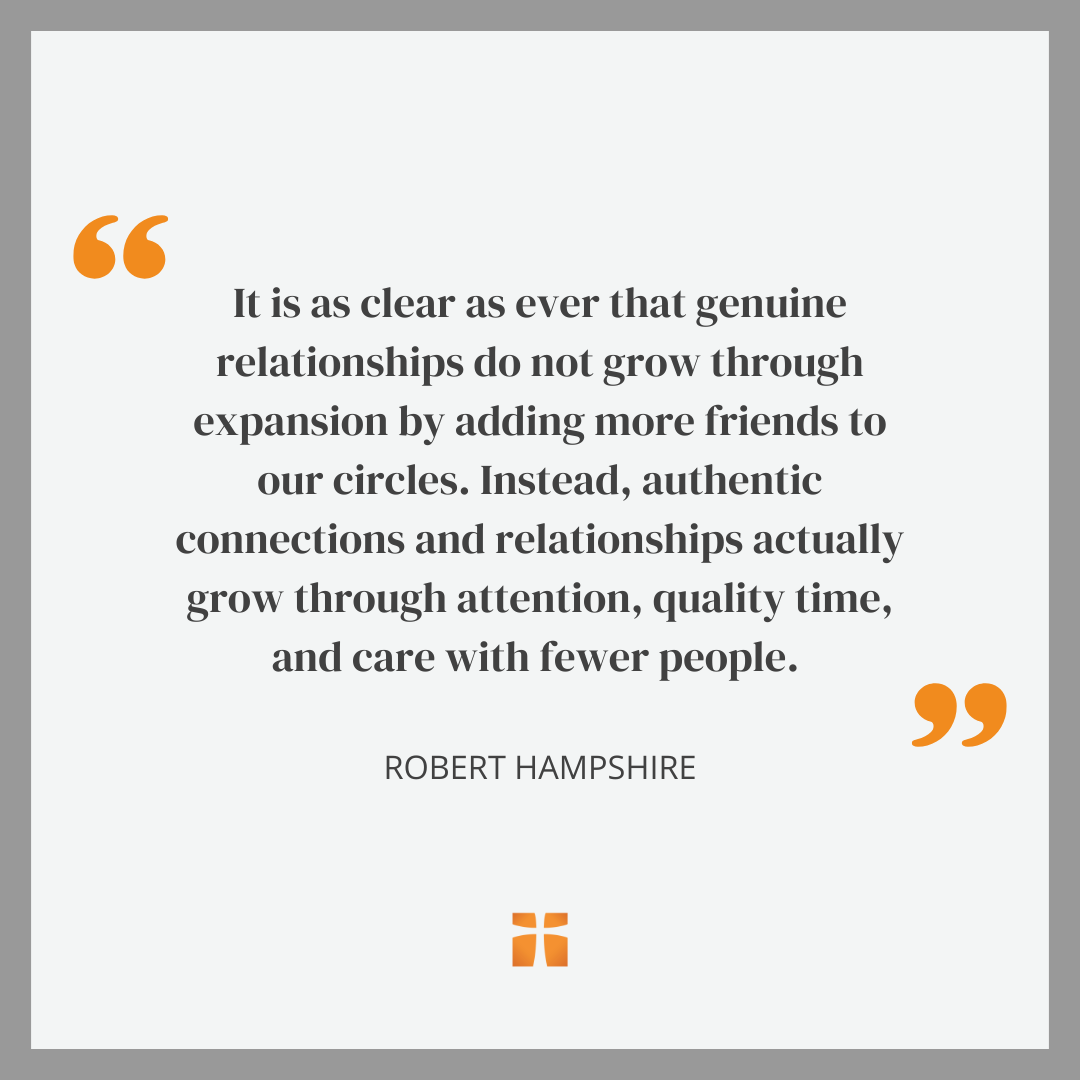“It is not good that man should be alone..."
This quote from Genesis 2:18 (NKJV) is one of the very first recorded statements spoken from the mouth of God in the Bible (and actually the first time he calls anything "not" good). As God looks at his first created human (Adam) and makes this statement, we discover a critical aspect of human nature: we were created for relationships with other people. As a result of this discovery (discovery for humans, not for God, who is all-knowing), God created the second human, Eve, as a helper and wife for Adam.
While this reality about humanity has been confirmed in countless ways throughout history, it often emerges more prominently at certain times. For example, researchers once theorized that humans can only maintain real, meaningful relationships with approximately 150 people (plus or minus a few). This specific number has been referred to as "Dunbar's Number." This number was based on the historic average size of an English village, church parish, and basic military unit or "company." New research in the field of sociology and psychology has recently revisited this number, only to find out that although we might "know" more people, the human brain (or I would say "soul") still simply cannot handle more relationships than this. We were created with cognitive limits on the number of people we can maintain a stable, trusting relationship with and that we feel an obligation to.
Why Is it Important to Discuss This Rather Than Worry about This Topic?
As you read through the first few books of the Bible, you might notice that for the first several generations of human history, everyone's connection with relatives was obvious because they lived in close proximity to each other. Especially when you read the infamous genealogies in the first few books of the Old Testament, you can see how important it was to know one's parents, grandparents, great-grandparents, and so on, because (at least for the Hebrews) property ownership was closely tied to their family relationships. In the smaller, more closely knit tribes of people (such as the twelve tribes of Israel), it was difficult to get too far away from close relationships with family.
For many people in the Western world today, it would be hard to imagine such a life and society. Today, it is not only possible but also common for someone to leave home, attend college, and land a job in a place where not only do they lack family connections, but they also have no friends at all. And to make that distance from relationships even more obvious, some people have work-from-home or remote jobs where they barely see anyone throughout their work week. Then, when people get sick or go through difficult times, they can end up feeling completely alone.
On the opposite end of the spectrum, we live in a Western culture that is more "connected" than ever before in human history - at least digitally with social media and the internet. It is not uncommon for someone to have hundreds or even thousands of "friends" on their Facebook, Instagram, or LinkedIn accounts. In addition to the digital sphere of relationships, many people belong to groups, clubs, schools, or workplaces that add dozens to hundreds of more "friends" or acquaintances to their lives, with whom they see regularly and are at least somewhat familiar.
One researcher refers to these groups of relationships as "layers" in our lives. These layers involve people with whom we are most intimate, then our best friends, good friends, acquaintances, and finally, people we simply recognize but do not know. On top of all those layers, though, in our modern world, news outlets from newspapers to television do their best to connect us with the personal lives of celebrities and stars. Each of these "layers" or concentric circles of connections adds more and more people that we feel the pressure to keep up with.
However, despite all the current "connections" we have been hearing about over the last decade or so, Western culture is the loneliest it has ever been. We have definitely discovered that we cannot be friends with everyone.
Remember Dunbar's Number? While some people have managed to stay away from nearly any meaningful relationships, leaving them empty and alone, others have so many shallow, surface-level relationships (obliterating that 150 number) that their friendship bonds have weakened, and empathy for others has faded. They no longer feel a sense of belonging to the people around them - including those who used to be their closest family members and friends.
It is as clear as ever that genuine relationships do not grow through expansion by adding more friends to our circles. Instead, authentic connections and relationships actually grow through attention, quality time, and care with fewer people.

Suppose God did not design us to be either alone or socially spread thin, but rather for depth in relationships. What can we do about our personal and cultural issues of loneliness and shallowness?
How Jesus Modeled Relational Wisdom
We look to Jesus.
When we examine the social aspect of Jesus' life, we can clearly see the multiple layers of connections he had. Jesus often had large crowds of hundreds to thousands of people around him, whom he was teaching or who were just following him, looking for the next miracle. At times, this crowd even turned into more of a mob that either tried to kill him or have the Roman leadership kill him! However, in none of the eyewitness accounts throughout the Gospels do we have evidence that he tried to get to know the crowd or become friends with everyone. Instead, after preaching to them or working a miracle, we often see him simply passing through the crowd to be with his disciples, to get some distance in a boat, or to go to a place to pray. In fact, Jesus would sometimes stop in the midst of the crowd of people if an individual cried out to Him for help (such as Jairus or the woman with a blood disorder in Luke 8).
Within that layer of "crowd," we can identify another layer of connection that we can call "acquaintances" that Jesus had due to his ministry, friendships, and travels. Some of these people followed him as disciples, and others did not. For example, it seems that Nicodemus and John chapter 3, the woman at the well in John chapter 4, Mary Magdalene in Luke 8, many of the "Seventy-Two" disciples in Luke 10, and others were around Jesus as acquaintances but were not really "friends" in the true sense of the word. But within that layer of people were others that we could actually call "friends" of Jesus, such as Lazarus and his family, his mother Mary, and most of his disciples (later called Apostles). We gain a sense of a closer relationship and fellowship with these people due to the amount of time he spent with them, the kinds of conversations he had with them, and the emotions he felt for them (such as the sadness he expressed in John 11 when Lazarus died).
Of course, right in the middle of all those layers of connections, we know that Jesus spent the most time with a very small group of people with whom he was most intimate, including Peter, James, and John. Jesus had such a close relationship with John, for example, that he entrusted him with the care of his mother when he died. And even though one disciple, Judas Iscariot, was around Jesus constantly, we couldn't really call them friends because of the lack of trust and closer, more intimate time spent together.
So the Son of God in flesh, Jesus Christ, perfectly exemplified for us what healthy relationships look like. Although he had varying levels of connection with so many people, he chose to love, listen to, and spend time with a few of them well. And if we, too, want to have healthy relationships that keep us from being either lonely or spread too thin, we need to follow Jesus's example and find a few people to love well, listen to deeply, and be fully present with.
In addition to the state of our western world that we mentioned, having healthy, close relationships with a few people with whom we are honest, transparent, and trustworthy is difficult for all of us. As we see in the story of "The Fall" of Adam and Eve in Genesis 3, broken or distant relationships are one of the major consequences of sin. However, with the help of the Holy Spirit, guided by Jesus as our example, and with these truths in mind, we can find happiness through good friendships.
Photo Credit: ©Getty Images/ Kinga Krzeminska



.jpg)

